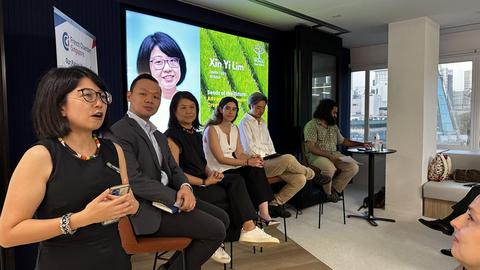Analyses & Studies • Publications
FOCUS 74: Sustainable Food Tech Innovation with Lesaffre

We spoke to Timothé Dupont, the General Manager of Lesaffre APAC to find out more about the global yeast manufacturer’s sustainable food initiatives across the baking, taste, healthcare and biotechnology industries.
Lesaffre’s mission is “Working together to better nourish and protect the planet”. How do sustainability and technology go together at Lesaffre?
Fermentation is at the heart of our activities. Yeast is well known and widely used for its fermenting abilities and is also very rich in proteins and micronutrients. For decades, Lesaffre has used yeast fractions to develop savoury solutions, health supplements, animal feed and plant care products.
Hand in hand with our customers and partners, Lesaffre’s 600 R&D experts are working hard to expand the applications of yeast and its components to better meet our customers’ needs and expectations.
20 to 30% of our investments are dedicated to environmental protection initiatives, not just limited to energy and water savings. For instance, molasses, a by-product of sugar production, are the main raw material for yeast production facilities. At Lesaffre, once the molasses are used, we treat them and return them to the planet as soil fertilisers or animal feed products. This composes an ethical and eco-friendly circle.
Our worldwide network of 60 plants also allows us to shorten the transportation routes required to move materials and products around.
As more consumers become interested in focusing their diets around sustainable ingredients, what are the key priorities of your business?
Changing consumer preferences are causing the agrifood industry to undergo a major shift. Aside from taste, health benefits and nutrition value, consumers increasingly consider the environmental cost incurred during production before making a food purchase decision. Additionally, we have observed a growing animal-free concern in food consumption patterns.
Taste has been something we have always focused on. Our animal-free yeast and yeast derivatives, natural flavour molecules and alcoholic fermentation yeasts all serve to accentuate flavour and aromas in food and drink.
For instance, Biospringer recently launched Springer Proteissimo™ 101, a yeast-derived protein that can be easily be formulated into food products without undesirable off-notes.
Also, Lesaffre continually widens its range of available yeast-based probiotics and dietary supplements through our Nutrition & Health business activities. Gnosis products are used to boost human health; Phileo products are employed for the well-being of animals; Agrauxine products targets plant care.
What are the challenges or opportunities brought on by the COVID19 crisis? Has it impacted consumption growth in your sector?
Despite the COVID-19 pandemic, consumption demand for Lesaffre’s yeast and yeast products remains strong. With Lesaffre’s products being used in so many vital industries, our biggest challenge is to keep our production and supply lines open. So far, we have managed this successfully.
At the beginning of the pandemic, we saw a huge increase in demand for food-related products due to panic buying, which has since calmed down.
I believe we will see several long-term behaviours:
More home-cooking and baking; demand for yeast and other home baking products spiked when stay-home measures were imposed.
Increased use of immunity-targeting food supplements
Businesses engaging in multiple sourcing for ingredients to avoid supply-chain disruptions
Pandemic or not, Lesaffre always strives to maintain the highest hygiene and food safety standards at our production facilities. We want to guard the health of our employees and customers through product safety and continuity.

Interview with Timothé Dupont, the General Manager of Lesaffre APAC, for FOCUS #74. To read more articles from this issue, download your digital copy here.


